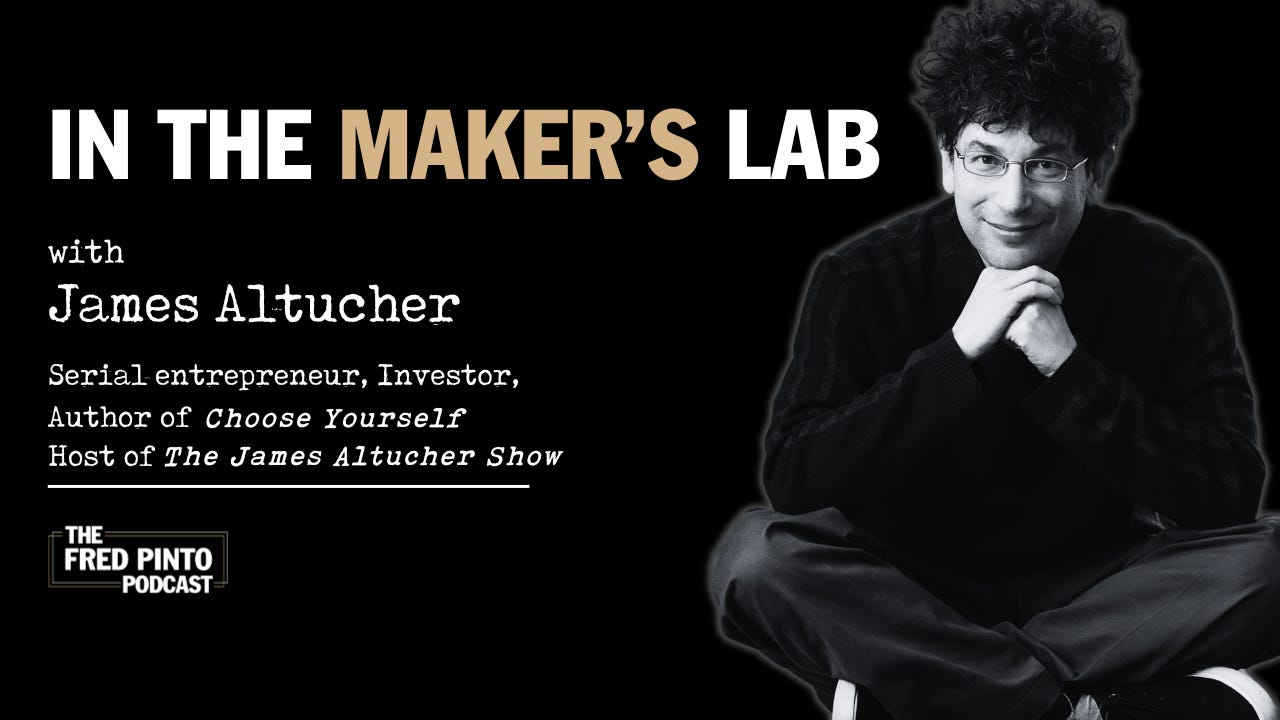The Practical Learning Playbook, With Author, Podcaster and Serial Entrepreneur James Altucher
YouTube | Apple Podcast | Spotify | Buzzsprout | Website
Mark Twain once wrote, "I’ve never let school get in the way of my education.”
In that spirit, some of our most successful entrepreneurs were either bad students or drop-outs altogether: Steve Jobs, Bill Gates, Mark Zuckerberg, Jack Dorsey, Steven Spielberg - the list goes on. Even Elon dropped out of his PhD in Physics at Stanford.
Despite their differences, one thread unites them all: the conclusion, reached at varying points in their respective journeys, but always before the top educational milestone they could’ve hit, that they could learn better outside of traditional classrooms.
Aristotle used to distinguish the idealized knowledge of philosophy from phronesis, or “practical wisdom”, which couldn’t be learned in lectures, only through messy, empirical trials. His school - the Lyceum – applied this concept: learning was acquired during long walks, filled with direct observations and the weighing of evidence. It was very different than Plato’s Academy, which used the kind of top-down, theoretical teaching our schooling system still largely prefers.
The split between Plato and Aristotle lives on to this day in the West, particularly among knowledge workers: the Platonists are those who favour the controlled environments of academia and parts of government, where pre-established theoretical frames rule the day. Aristotelians, on the other hand, tend to gravitate toward the messier realms of entrepreneurship, and research science, where even the best theories are tested – often brutally – in the crucible of experiment.
But this makes them no less the learners than their more credentialed, official-sounding colleagues from the Platonic world.
By all accounts, our “drop-out entrepreneurs” are among the most potent learners we’ve ever had. They use their desire to win to design practical learning experiments which are far beyond what you typically find in academia. It may appear to outsiders they are uniquely focused on winning, but to paraphrase Eric Reis, in entrepreneurship, “the only way to win is to learn faster than anyone else.”
In this interview, I talk to tech entrepreneur, investor, best-selling author and podcast host James Altucher. He shares his practical tips from decades of learning through messy and fun marketplace experiments.
James embodies the kind of “tinkerer” approach that characterizes many of our most successful entrepreneurs.
In the course of a career spent playing successfully in fields as diverse as tech, finance, media, and consumer brands, James has developed a personalized process that starts by playfully “nibbling” at something he finds interesting and staying wide open to feedback, both positive and negative.
He then turns to an odd emotion as a cue for direction:
One thing I always try to ask myself when I write anything, even just an article, is, is there some reason I'm afraid to hit publish? And if I'm not afraid, I won't publish it. Because if I'm not afraid, that means I'm just saying something everyone else is saying.
By reframing fear as meaning not “danger”, but “interesting novelty”, James achieves two things: (a) he drums up the courage needed to launch something new, and (b) he makes sure there are real emotional stakes, which enhances alertness.
Interestingly, according to the latest scientific research on flow compiled by Steven Kotler’s Flow Research Collective, taking risks is one of the most reliable “flow triggers” we have: “the willingness to take on challenges or engage in activities that involve a certain level of risk can enhance the flow experience by adding excitement, novelty, and the need for focused attention and adaptive responses.”
This, perhaps, is one of the keys to having a maker’s mindset: being more excited to learn something new than afraid of getting something wrong.
This interview felt like being “in the lab” with a lifelong tinkerer, and James’ fun energy and total openness on even the trickier chapters of his journey made it a very rewarding – and educational – experience.
You can start with this clip you can start with this clip on how standing out as truly unique is better than competing conventionally.




